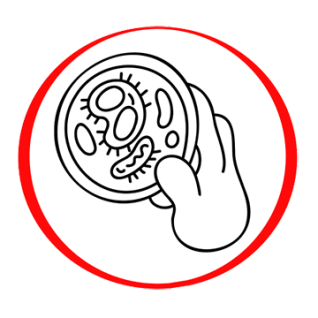
Breast Milk Culture
25.00€
Validity period for online orders: 3 months from the date of purchase.
Breast milk culture is a specialized laboratory test designed to evaluate the microbiological composition of breast milk. This significant test helps identify potential infections or other disorders that could affect the health of both the mother and the infant. The purpose of the test is to determine whether there are pathogenic microorganisms in the milk that could cause infections or other health problems. Since breast milk is the primary source of nutrition for the infant during the first months of life, it is important to ensure that it is safe and does not pose additional health risks.
Purpose of the Test
Breast milk culture helps identify various bacterial pathogens, such as Staphylococcus aureus or Streptococcus, that can cause infections in both the mother and the infant. The test is especially useful when mastitis, an inflammation of the mammary gland due to bacterial infection, is suspected. Furthermore, this test may be recommended if the infant shows symptoms of gastroenteritis or other infections that could originate from contaminated breast milk. Early detection and treatment of infections can prevent more serious complications.
Symptoms and Indications
A doctor may recommend a breast milk culture if certain symptoms or situations arise. For example, if the mother experiences breast pain typical of mastitis or notices changes in the color and consistency of the milk. The test may also be ordered if the infant exhibits unexplained diarrhea, vomiting, or other signs of infection. For preventive purposes, the test may be recommended for mothers who have had previous infections or whose infants are more sensitive to health issues.
Test Procedure
Breast milk culture is performed by collecting a small amount of milk in a sterile environment. It is recommended to thoroughly wash hands and the breast before the test to avoid contamination. No special preparation is required from the mother, but it is important to ensure that the sample is properly collected. Results are usually provided within a few days, depending on the laboratory's workload and the complexity of the test.
Interpretation of Results
An increased amount of pathogenic bacteria in breast milk may indicate an infection that needs to be treated, often with antibiotics. Reduced or normal levels generally indicate no infection. However, it is important to understand that results can be influenced by various factors, such as recent medication use or improper sample collection. Therefore, consulting a doctor to correctly interpret the results and determine the next steps is advisable.
Health Significance
Breast milk culture is an important test that helps ensure the health of both the mother and the infant. Early detection and treatment of infections can prevent severe complications, such as sepsis or chronic mastitis. Additionally, regular health monitoring helps mothers better understand their and their infant's health condition, ensuring that nutrition and care are optimal. This not only contributes to the healthy development of the infant but also provides peace of mind to the mother, knowing that the milk is safe and healthy.

Reference: 17952
25.00€







